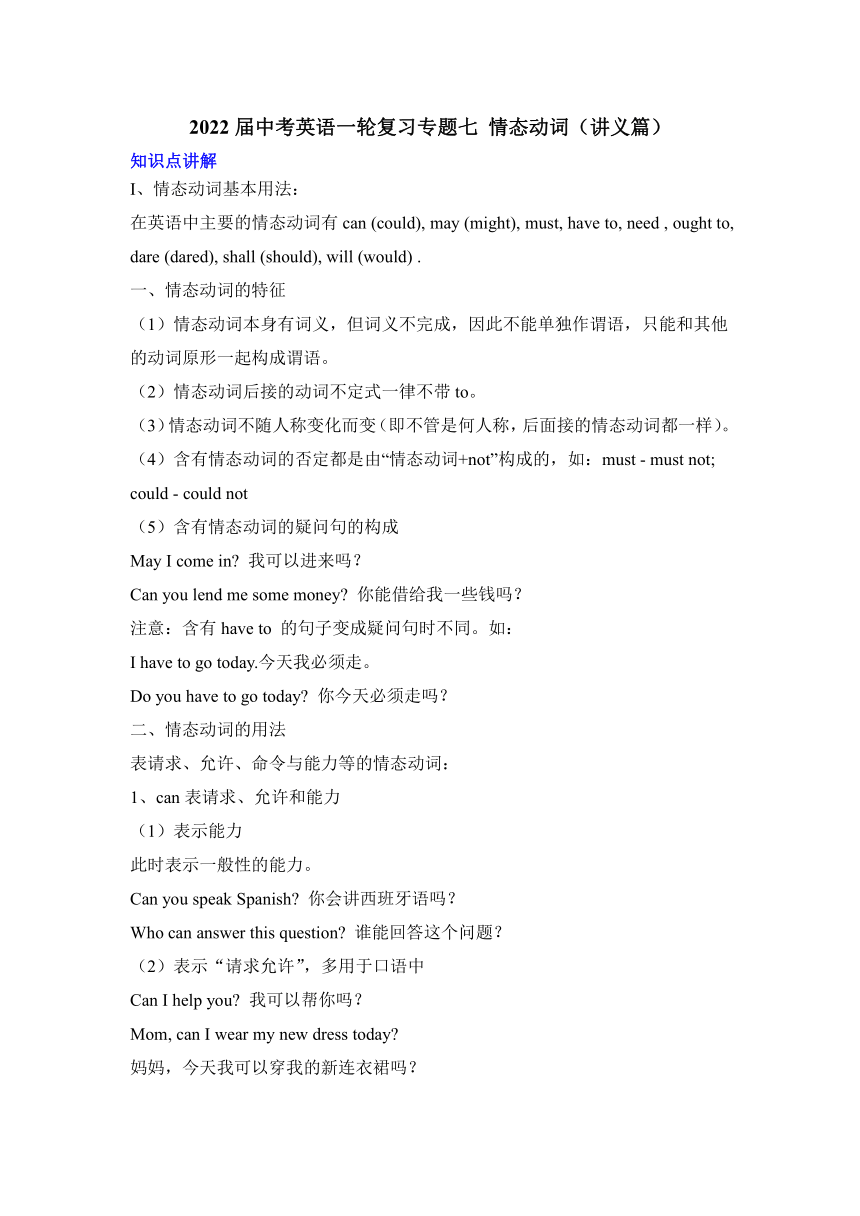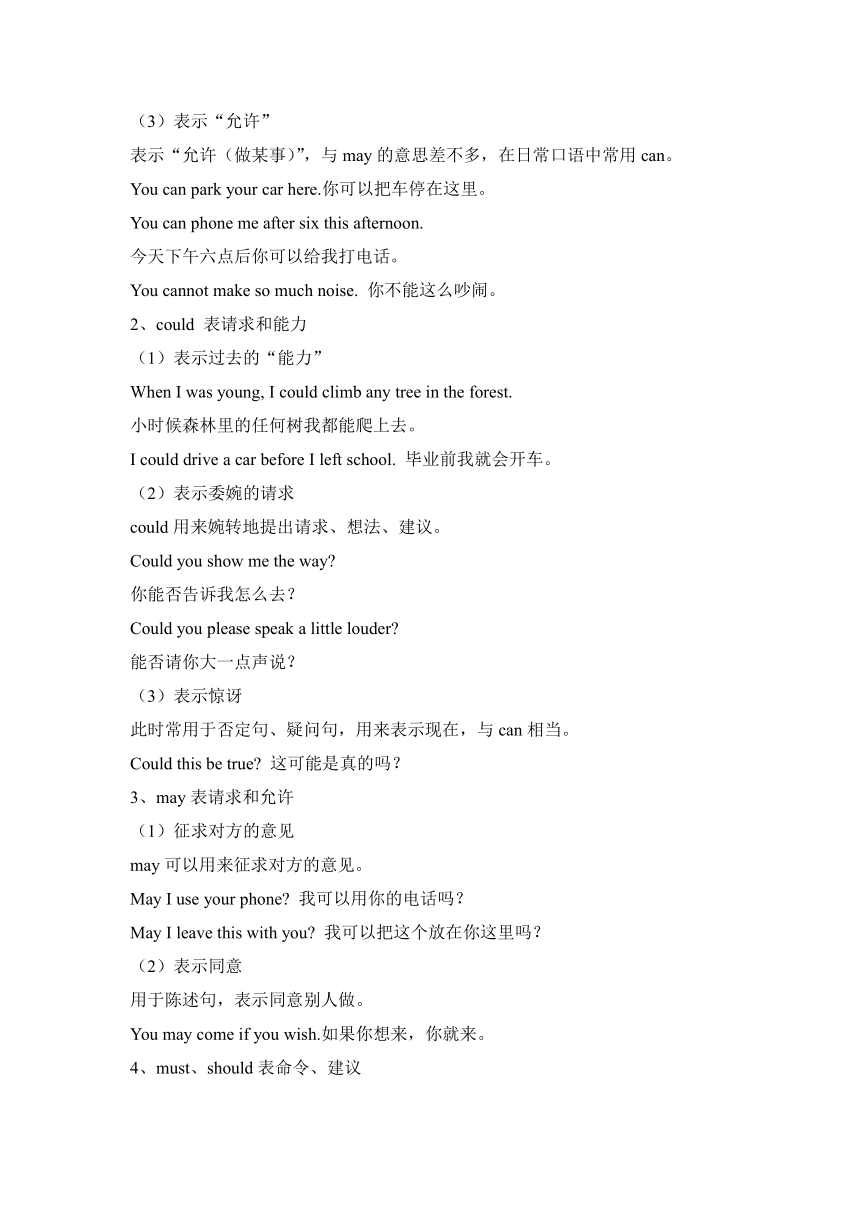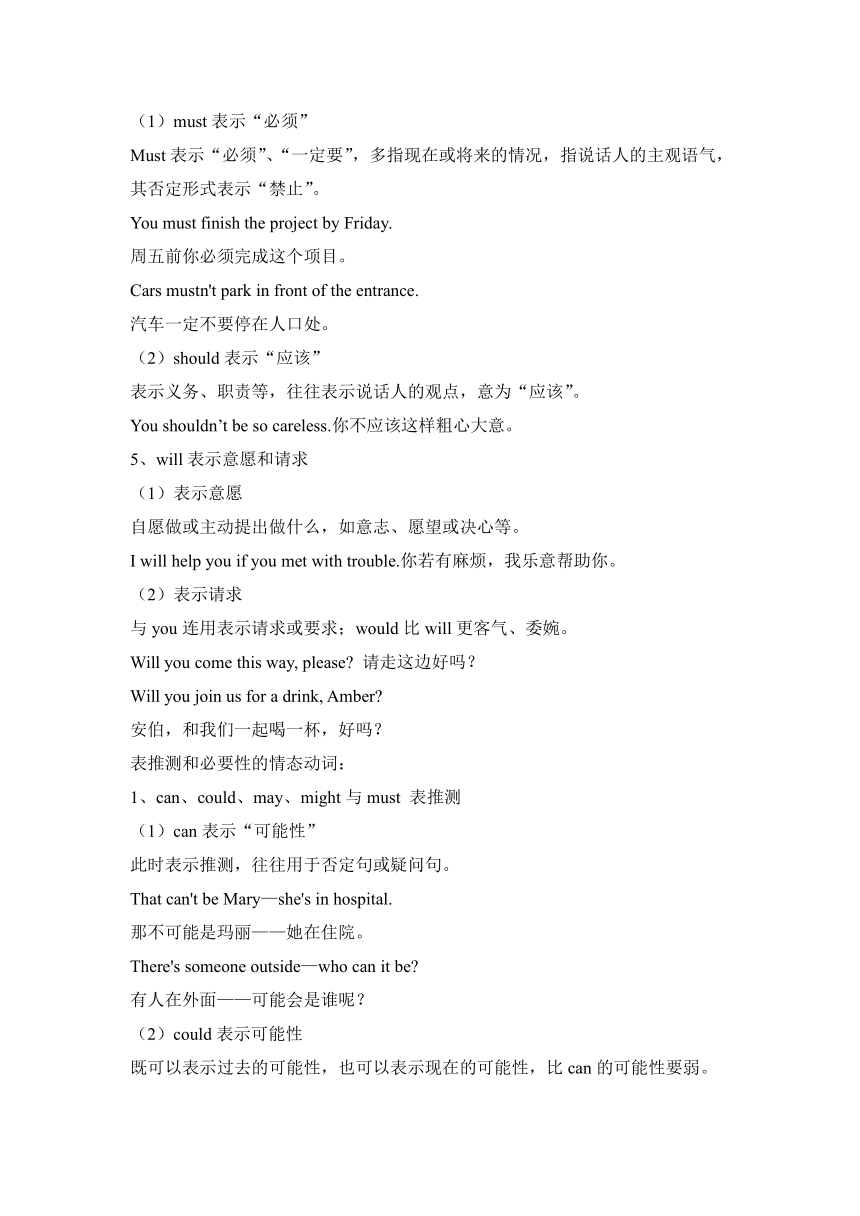2022年中考英语一轮复习专题七情态动词(讲义篇)(含解析)
文档属性
| 名称 | 2022年中考英语一轮复习专题七情态动词(讲义篇)(含解析) |

|
|
| 格式 | docx | ||
| 文件大小 | 21.9KB | ||
| 资源类型 | 教案 | ||
| 版本资源 | 通用版 | ||
| 科目 | 英语 | ||
| 更新时间 | 2022-01-19 00:00:00 | ||
图片预览




文档简介
2022届中考英语一轮复习专题七 情态动词(讲义篇)
知识点讲解
Ⅰ、情态动词基本用法:
在英语中主要的情态动词有can (could), may (might), must, have to, need , ought to, dare (dared), shall (should), will (would) .
一、情态动词的特征
(1)情态动词本身有词义,但词义不完成,因此不能单独作谓语,只能和其他的动词原形一起构成谓语。
(2)情态动词后接的动词不定式一律不带to。
(3)情态动词不随人称变化而变(即不管是何人称,后面接的情态动词都一样)。
(4)含有情态动词的否定都是由“情态动词+not”构成的,如:must - must not; could - could not
(5)含有情态动词的疑问句的构成
May I come in 我可以进来吗?
Can you lend me some money 你能借给我一些钱吗?
注意:含有have to 的句子变成疑问句时不同。如:
I have to go today.今天我必须走。
Do you have to go today 你今天必须走吗?
二、情态动词的用法
表请求、允许、命令与能力等的情态动词:
1、can表请求、允许和能力
(1)表示能力
此时表示一般性的能力。
Can you speak Spanish 你会讲西班牙语吗?
Who can answer this question 谁能回答这个问题?
(2)表示“请求允许”,多用于口语中
Can I help you 我可以帮你吗?
Mom, can I wear my new dress today
妈妈,今天我可以穿我的新连衣裙吗?
(3)表示“允许”
表示“允许(做某事)”,与may的意思差不多,在日常口语中常用can。
You can park your car here.你可以把车停在这里。
You can phone me after six this afternoon.
今天下午六点后你可以给我打电话。
You cannot make so much noise. 你不能这么吵闹。
2、could 表请求和能力
(1)表示过去的“能力”
When I was young, I could climb any tree in the forest.
小时候森林里的任何树我都能爬上去。
I could drive a car before I left school. 毕业前我就会开车。
(2)表示委婉的请求
could用来婉转地提出请求、想法、建议。
Could you show me the way
你能否告诉我怎么去?
Could you please speak a little louder
能否请你大一点声说?
(3)表示惊讶
此时常用于否定句、疑问句,用来表示现在,与can相当。
Could this be true 这可能是真的吗?
3、may表请求和允许
(1)征求对方的意见
may可以用来征求对方的意见。
May I use your phone 我可以用你的电话吗?
May I leave this with you 我可以把这个放在你这里吗?
(2)表示同意
用于陈述句,表示同意别人做。
You may come if you wish.如果你想来,你就来。
4、must、should表命令、建议
(1)must表示“必须”
Must表示“必须”、“一定要”,多指现在或将来的情况,指说话人的主观语气,其否定形式表示“禁止”。
You must finish the project by Friday.
周五前你必须完成这个项目。
Cars mustn't park in front of the entrance.
汽车一定不要停在人口处。
(2)should表示“应该”
表示义务、职责等,往往表示说话人的观点,意为“应该”。
You shouldn’t be so careless.你不应该这样粗心大意。
5、will表示意愿和请求
(1)表示意愿
自愿做或主动提出做什么,如意志、愿望或决心等。
I will help you if you met with trouble.你若有麻烦,我乐意帮助你。
(2)表示请求
与you连用表示请求或要求;would比will更客气、委婉。
Will you come this way, please 请走这边好吗?
Will you join us for a drink, Amber
安伯,和我们一起喝一杯,好吗?
表推测和必要性的情态动词:
1、can、could、may、might与must 表推测
(1)can表示“可能性”
此时表示推测,往往用于否定句或疑问句。
That can't be Mary—she's in hospital.
那不可能是玛丽——她在住院。
There's someone outside—who can it be
有人在外面——可能会是谁呢?
(2)could表示可能性
既可以表示过去的可能性,也可以表示现在的可能性,比can的可能性要弱。
He said the news could be true. 他说消息可能是真的。(表示过去的可能性)
Someone is knocking at the door. Who could it be
有人在敲门,可能会是谁呢?(表示现在的可能性)
(3)may 表示可能性
may表示的可能性比 can小。
Anna may know my phone number.安娜可能知道我的电话号码。
He may come very soon.也或许很快就会来。
(4)might表示可能性
此时可以指过去的可能性,也可指现在的可能性性。指现在可能性比may表示的可能性小。
He told me he might be late.他告诉我他可能会晚到。
He might come tomorrow, but I am not quite sure.他明天可能来,但我拿不准。
(5)must表示推测
此时常译为“一定是”、“准是”,常指有根据的、比较有把握的推测。这种用法只能用于肯定句。
Jack and Dick must be twins. They look so much alike.
杰克和迪克准是双胞胎。他们长得太像了。
2、need 表示必要性和需要
(1)在表否定的句子中,表示“不必”,还可以说don’t have to。
You needn't come if you are busy.如果忙,你就不必来了。
We needn't hurry, for there's plenty of time.
我们不必着急,因为时间很充裕。
I don't believe you need worry.我认为你没有必要担心
She said I needn't pay until May. 她说我到五月份才需要付款。
(2)在疑问句和肯定句中,表示“需要”
—Need I come tomorrow
——我明天需要来吗?
—No, you needn't./Yes, you must.
——不,没必要。/是的,你必须来。
Ⅱ、易混易错知识点
1、need作情态动词和实义动词的用法区别
(1)need表示“需要;必要”,既可以作情态动词,又可以作实义动词。
①.need用作情态动词时,后接动词原形,此时其没有人称和数的变化,通常用于否定句和疑问句中。
②.need用作实义动词时,有各种时态的变化,可用于各种句式;其宾语可以是名词、动名词、动词不定式以及代词。构成其否定句和疑问句时要借助助动词do。
(2)①.由于用作情态动词的need通常用于否定句和疑问句中,所以对于need开头的疑问句和否定句的回答可用needn't,但肯定回答要用must。
②. 由must引出的一般疑问句,其肯定句回答用must,否定回答用needn't或don't have to。
作为情态动词的“need”的用法与其他情态动词“can”,“may”,“must”的用法基本相同:在限定动词词组中总是位居第一,没有非限定形式,即没有不定式、-ing分词或-ed分词等形式;第三人称单数现在时没有词形变化;情态动词之间是相互排斥的,即在一个限定动词词组中只能有一个情态动词。
2、must 与have to的区别
have to的意思接近must,但must更强调说话者的主观意愿。have to 强调客观上的必要性,常译为“不得不”。don't have to译为“不必”。
I have to be off now. My mum is waiting for me.
我现在得走了,妈妈在等我。
We must work hard at school.在学校我们必须努力学习。
3、can 和be able to的区别
can 和be able to 表示能力时用法相同,can只有一般现在时和一般过去时(could),be able to有现在时、过去时和将来时。如:
Jim couldn’t speak Chinese last year, but now he can.
吉姆去年不会说汉语,但现在他会了。
We will be able to come back next week. 我们下周能回来。
典例剖析
单项选择
1.(2021北京,4)—Sam, I join you in the community service
—Of course you can.
A. can B. must C. should D. need
2.(2021天津,26)People talk on a mobile phone while they are driving.
A. shouldn't B. needn't C. must D. can
3.(2021江苏连云港,6)What an amazing robot! It cook more than 5,000 dishes.
A. shall B. need C. must D. can
4.(2021福建,25)According to the new regulation (规定), school students take their cell phones to the classroom.
A. wouldn’t B. needn't C. mustn't
5.(2021内蒙去包头,26)—Hi, Carl! I'm leaving for Chengdu this weekend.
—Cool! But I get away until the end of July.
A. shouldn't B. can't C. needn't D. mustn't
6.(2021海南,31)—How long can I keep these books
—According to the library rules, you return them within 7 days.
A. must B. might C. could
7.(2021湖北武汉,35)—Only ten tickets What do you mean There be twelve.
—Sorry, Linda. Jacky and Tim took two tickets away.
A. should B. will C. can D. may
8.(2021江苏扬州,7)We see which way to go if the stars do not twinkle (闪耀) so.
A. can not B. should not C. must not D. need not
9.(2021青海,26)—Lucy, you still look pale. How about your stomachache
—I've taken some medicine, but it doesn't work. I go to see a doctor.
A. must B. should C. can
10.(2021 云南,24)—You take photos here! Look at the sign. It says “No photos”.
—Sorry, I won't.
A. must B. need C. mustn't D. needn’t
答案以及解析
单选题
1.A句意:—Sam,我可以加入你,一起做社区服务吗?——当然可以。本题考查情态动词的用法。根据答语Of course you can.可知问句是在表示请求,要用can来提问,故选A。
2.A本题考查情态动词的用法。句意:人们不应该在开车的时候打移动电话。shouldn’t不应该;needn't不需要;must一定,必须;can能,会。根据句意可知选A。
3.D句意:多么令人惊奇的机器人!它会做5,000多道菜。本题考查情态动词。根据What an amazing robot! 可知,空格处应填can,指机器人会做5,000多道菜的能力令人惊叹。故选D。
4.C句意:根据新的规定,学校的学生严禁把手机带到教室。本题考查情态动词词义辨析。wouldn't不会;needn’t不必;mustn’t严禁。由句意可知本题选C。
5. B本题考查情态动词词义辨析。shouldn't不应该;can’t不能;needn’t不必;mustn’t严禁。此处指我直到七月末才能离开。故答案为B。
6. A考查情态动词。根据关键词the library rules可知,设空处表示“必须”,故选A。
7. 本题考查情态动词。Should应该;will将会;can能够,可能;may可能。根据上下文语境可知,应该有12张票。故选A。
8.A句意:如果星星不这么闪烁,我们就看不见要走哪条路。本题考查情态动词辨析。can not不能;should not不应该;must not严禁;need not不必。根据语境可知,设空处应该是不能看见。故答案为A。
9.A考查情态动词。依据语境可知谈话者之前吃了药但没有效,所以此处应表达“我必须去看医生”。故答案选A。
10.C本题考查情态动词。根据后面的句子It says “No photos”.可知,这里说的是“禁止拍照”,故选C。
知识点讲解
Ⅰ、情态动词基本用法:
在英语中主要的情态动词有can (could), may (might), must, have to, need , ought to, dare (dared), shall (should), will (would) .
一、情态动词的特征
(1)情态动词本身有词义,但词义不完成,因此不能单独作谓语,只能和其他的动词原形一起构成谓语。
(2)情态动词后接的动词不定式一律不带to。
(3)情态动词不随人称变化而变(即不管是何人称,后面接的情态动词都一样)。
(4)含有情态动词的否定都是由“情态动词+not”构成的,如:must - must not; could - could not
(5)含有情态动词的疑问句的构成
May I come in 我可以进来吗?
Can you lend me some money 你能借给我一些钱吗?
注意:含有have to 的句子变成疑问句时不同。如:
I have to go today.今天我必须走。
Do you have to go today 你今天必须走吗?
二、情态动词的用法
表请求、允许、命令与能力等的情态动词:
1、can表请求、允许和能力
(1)表示能力
此时表示一般性的能力。
Can you speak Spanish 你会讲西班牙语吗?
Who can answer this question 谁能回答这个问题?
(2)表示“请求允许”,多用于口语中
Can I help you 我可以帮你吗?
Mom, can I wear my new dress today
妈妈,今天我可以穿我的新连衣裙吗?
(3)表示“允许”
表示“允许(做某事)”,与may的意思差不多,在日常口语中常用can。
You can park your car here.你可以把车停在这里。
You can phone me after six this afternoon.
今天下午六点后你可以给我打电话。
You cannot make so much noise. 你不能这么吵闹。
2、could 表请求和能力
(1)表示过去的“能力”
When I was young, I could climb any tree in the forest.
小时候森林里的任何树我都能爬上去。
I could drive a car before I left school. 毕业前我就会开车。
(2)表示委婉的请求
could用来婉转地提出请求、想法、建议。
Could you show me the way
你能否告诉我怎么去?
Could you please speak a little louder
能否请你大一点声说?
(3)表示惊讶
此时常用于否定句、疑问句,用来表示现在,与can相当。
Could this be true 这可能是真的吗?
3、may表请求和允许
(1)征求对方的意见
may可以用来征求对方的意见。
May I use your phone 我可以用你的电话吗?
May I leave this with you 我可以把这个放在你这里吗?
(2)表示同意
用于陈述句,表示同意别人做。
You may come if you wish.如果你想来,你就来。
4、must、should表命令、建议
(1)must表示“必须”
Must表示“必须”、“一定要”,多指现在或将来的情况,指说话人的主观语气,其否定形式表示“禁止”。
You must finish the project by Friday.
周五前你必须完成这个项目。
Cars mustn't park in front of the entrance.
汽车一定不要停在人口处。
(2)should表示“应该”
表示义务、职责等,往往表示说话人的观点,意为“应该”。
You shouldn’t be so careless.你不应该这样粗心大意。
5、will表示意愿和请求
(1)表示意愿
自愿做或主动提出做什么,如意志、愿望或决心等。
I will help you if you met with trouble.你若有麻烦,我乐意帮助你。
(2)表示请求
与you连用表示请求或要求;would比will更客气、委婉。
Will you come this way, please 请走这边好吗?
Will you join us for a drink, Amber
安伯,和我们一起喝一杯,好吗?
表推测和必要性的情态动词:
1、can、could、may、might与must 表推测
(1)can表示“可能性”
此时表示推测,往往用于否定句或疑问句。
That can't be Mary—she's in hospital.
那不可能是玛丽——她在住院。
There's someone outside—who can it be
有人在外面——可能会是谁呢?
(2)could表示可能性
既可以表示过去的可能性,也可以表示现在的可能性,比can的可能性要弱。
He said the news could be true. 他说消息可能是真的。(表示过去的可能性)
Someone is knocking at the door. Who could it be
有人在敲门,可能会是谁呢?(表示现在的可能性)
(3)may 表示可能性
may表示的可能性比 can小。
Anna may know my phone number.安娜可能知道我的电话号码。
He may come very soon.也或许很快就会来。
(4)might表示可能性
此时可以指过去的可能性,也可指现在的可能性性。指现在可能性比may表示的可能性小。
He told me he might be late.他告诉我他可能会晚到。
He might come tomorrow, but I am not quite sure.他明天可能来,但我拿不准。
(5)must表示推测
此时常译为“一定是”、“准是”,常指有根据的、比较有把握的推测。这种用法只能用于肯定句。
Jack and Dick must be twins. They look so much alike.
杰克和迪克准是双胞胎。他们长得太像了。
2、need 表示必要性和需要
(1)在表否定的句子中,表示“不必”,还可以说don’t have to。
You needn't come if you are busy.如果忙,你就不必来了。
We needn't hurry, for there's plenty of time.
我们不必着急,因为时间很充裕。
I don't believe you need worry.我认为你没有必要担心
She said I needn't pay until May. 她说我到五月份才需要付款。
(2)在疑问句和肯定句中,表示“需要”
—Need I come tomorrow
——我明天需要来吗?
—No, you needn't./Yes, you must.
——不,没必要。/是的,你必须来。
Ⅱ、易混易错知识点
1、need作情态动词和实义动词的用法区别
(1)need表示“需要;必要”,既可以作情态动词,又可以作实义动词。
①.need用作情态动词时,后接动词原形,此时其没有人称和数的变化,通常用于否定句和疑问句中。
②.need用作实义动词时,有各种时态的变化,可用于各种句式;其宾语可以是名词、动名词、动词不定式以及代词。构成其否定句和疑问句时要借助助动词do。
(2)①.由于用作情态动词的need通常用于否定句和疑问句中,所以对于need开头的疑问句和否定句的回答可用needn't,但肯定回答要用must。
②. 由must引出的一般疑问句,其肯定句回答用must,否定回答用needn't或don't have to。
作为情态动词的“need”的用法与其他情态动词“can”,“may”,“must”的用法基本相同:在限定动词词组中总是位居第一,没有非限定形式,即没有不定式、-ing分词或-ed分词等形式;第三人称单数现在时没有词形变化;情态动词之间是相互排斥的,即在一个限定动词词组中只能有一个情态动词。
2、must 与have to的区别
have to的意思接近must,但must更强调说话者的主观意愿。have to 强调客观上的必要性,常译为“不得不”。don't have to译为“不必”。
I have to be off now. My mum is waiting for me.
我现在得走了,妈妈在等我。
We must work hard at school.在学校我们必须努力学习。
3、can 和be able to的区别
can 和be able to 表示能力时用法相同,can只有一般现在时和一般过去时(could),be able to有现在时、过去时和将来时。如:
Jim couldn’t speak Chinese last year, but now he can.
吉姆去年不会说汉语,但现在他会了。
We will be able to come back next week. 我们下周能回来。
典例剖析
单项选择
1.(2021北京,4)—Sam, I join you in the community service
—Of course you can.
A. can B. must C. should D. need
2.(2021天津,26)People talk on a mobile phone while they are driving.
A. shouldn't B. needn't C. must D. can
3.(2021江苏连云港,6)What an amazing robot! It cook more than 5,000 dishes.
A. shall B. need C. must D. can
4.(2021福建,25)According to the new regulation (规定), school students take their cell phones to the classroom.
A. wouldn’t B. needn't C. mustn't
5.(2021内蒙去包头,26)—Hi, Carl! I'm leaving for Chengdu this weekend.
—Cool! But I get away until the end of July.
A. shouldn't B. can't C. needn't D. mustn't
6.(2021海南,31)—How long can I keep these books
—According to the library rules, you return them within 7 days.
A. must B. might C. could
7.(2021湖北武汉,35)—Only ten tickets What do you mean There be twelve.
—Sorry, Linda. Jacky and Tim took two tickets away.
A. should B. will C. can D. may
8.(2021江苏扬州,7)We see which way to go if the stars do not twinkle (闪耀) so.
A. can not B. should not C. must not D. need not
9.(2021青海,26)—Lucy, you still look pale. How about your stomachache
—I've taken some medicine, but it doesn't work. I go to see a doctor.
A. must B. should C. can
10.(2021 云南,24)—You take photos here! Look at the sign. It says “No photos”.
—Sorry, I won't.
A. must B. need C. mustn't D. needn’t
答案以及解析
单选题
1.A句意:—Sam,我可以加入你,一起做社区服务吗?——当然可以。本题考查情态动词的用法。根据答语Of course you can.可知问句是在表示请求,要用can来提问,故选A。
2.A本题考查情态动词的用法。句意:人们不应该在开车的时候打移动电话。shouldn’t不应该;needn't不需要;must一定,必须;can能,会。根据句意可知选A。
3.D句意:多么令人惊奇的机器人!它会做5,000多道菜。本题考查情态动词。根据What an amazing robot! 可知,空格处应填can,指机器人会做5,000多道菜的能力令人惊叹。故选D。
4.C句意:根据新的规定,学校的学生严禁把手机带到教室。本题考查情态动词词义辨析。wouldn't不会;needn’t不必;mustn’t严禁。由句意可知本题选C。
5. B本题考查情态动词词义辨析。shouldn't不应该;can’t不能;needn’t不必;mustn’t严禁。此处指我直到七月末才能离开。故答案为B。
6. A考查情态动词。根据关键词the library rules可知,设空处表示“必须”,故选A。
7. 本题考查情态动词。Should应该;will将会;can能够,可能;may可能。根据上下文语境可知,应该有12张票。故选A。
8.A句意:如果星星不这么闪烁,我们就看不见要走哪条路。本题考查情态动词辨析。can not不能;should not不应该;must not严禁;need not不必。根据语境可知,设空处应该是不能看见。故答案为A。
9.A考查情态动词。依据语境可知谈话者之前吃了药但没有效,所以此处应表达“我必须去看医生”。故答案选A。
10.C本题考查情态动词。根据后面的句子It says “No photos”.可知,这里说的是“禁止拍照”,故选C。
